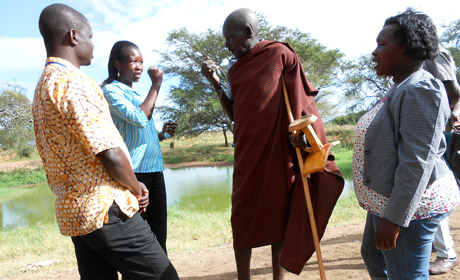Nourish: Development of a Ugandan-Irish HIV/Nutrition Research Cluster
25/7/16
Nourish researchers consulting with Community leaders in Karamoja region, Northern Uganda. Photo Copyright: Nourish Project
NOURISH is an Irish Aid funded project to investigate the links between, nutrition, food security, and HIV treatment outcome across Uganda. Their goal is to better understand the experience of people living with HIV and hunger, and ultimately to test and scale up interventions and programmes that may help improve health and nutrition.
Poor nutritional status and food insecurity is associated with poor immune responses and adverse health outcomes among children and adults infected with and receiving treatment for HIV. Although Uganda’s response to HIV/AIDS has been recognised to be relatively effective, there are emerging issues which require urgent attention.
Between 2005 and 2013 there has been a 20% decline in AIDS-related deaths in Uganda. However, effective treatment does not yet reach all groups and there has been a recent rise in new infections. The current prevalence of HIV is 7.5%.
Simple interventions to improve the health and welfare of women attending HIV clinics made a positive difference
NOURISH researchers have gathered information on the experiences of more than 5,000 people across Uganda. Preliminary results from NOURISH show that, in Uganda:
- Severely malnourished patients on treatment for HIV reported improved quality of life and fewer work days lost, when receiving supplementary feeding with a Ready-To-Use Therapeutic Food (RUTF) for 12 weeks.
- Consumption of starchy foods is high and consumption of animal products low in Karamoja, Northern Uganda. When food is scarce, coping strategies include consumption of wild foods (both plants and animals), and reducing both meal number and size.
- Randomised control trials demonstrated that simple interventions to improve the health and welfare of women attending HIV clinics made a positive difference, such as a nutrition information campaign.
The NOURISH project partners are: Trinity College Dublin; Makerere University; Gulu University; Joint Clinical Research Centre; Infectious Diseases Institute; with collaboration from University College Dublin, and Kings College London.

